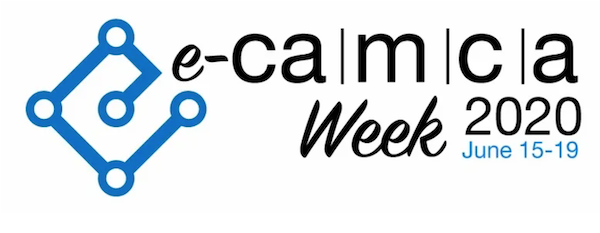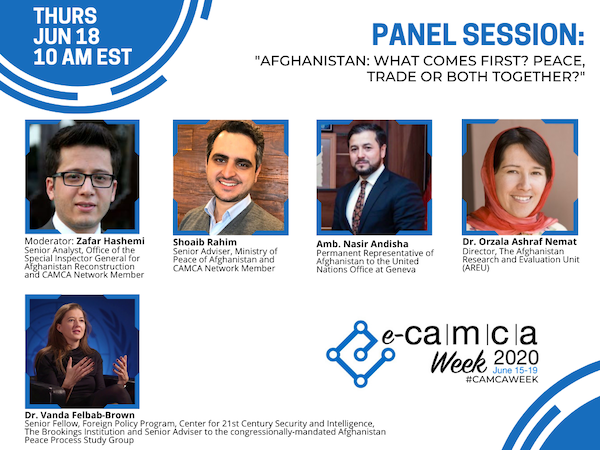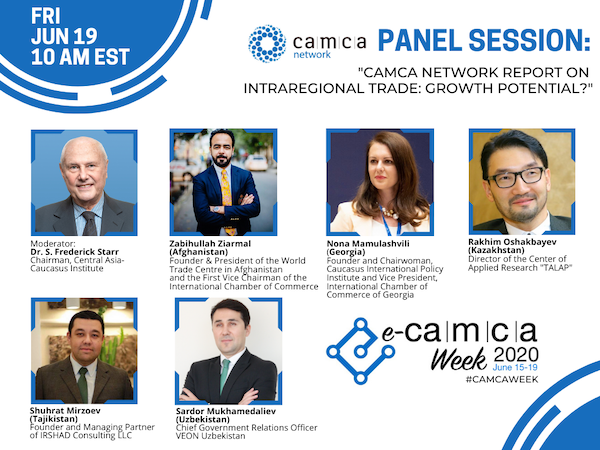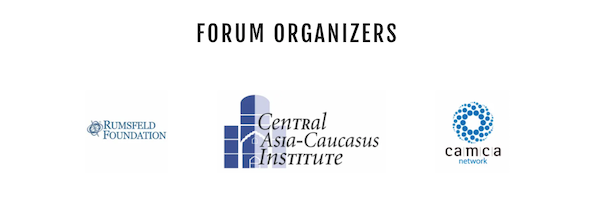(All times EST)
MONDAY, JUNE 21st
9:45-10:00 AM
“New Opportunities Across CAMCA” - Welcome & Remarks by Dr. Svante Cornell Director, Central Asia-Caucasus Institute, American Foreign Policy Council
Watch it here
10:00-11:00 AM
Panel Discussion - “New Regionalism in Central Asia and Its Challenges”
Moderator:
Dr. S. Frederick Starr, Chairman, Central Asia-Caucasus Institute, AFPC
Speakers:
Dennis de Tray, Board Member and Adviser to the President, Nazarbayev University
Dr. Subir Lall, Deputy Director, Middle East and Central Asia Department, IMF
Dr. Eldor Aripov, Director, Institute for Strategic and Regional Studies under the President of the Republic of Uzbekistan
Dr. Taleh Ziyadov, Director General, Baku International Sea Trade Port, Azerbaijan
Aziza Umarova, Co-Founder, SmartGov Consulting; CAMCA Network Member, Uzbekistan
Watch it here
TUESDAY, JUNE 22nd
9:00-9:45 AM
Keynote Interview with Dr. Sergei Guriev, Professor of Economics & Scientific Director of the Master and PhD programmes in Economics, Sciences Po
Interviewer:
Rakhim Oshakbayev, Director, Center of Applied Research “TALAP”; CAMCA Network Member, Kazakhstan
Watch it here
10:00-11:00 AM
Panel Discussion - “U.S. Withdrawal from Afghanistan: What Does it Mean for Political and Economic Alignments in the Region?”
Moderator:
Michael Doran, Senior Fellow, Hudson Institute
Speakers:
Dr. Omar Sharifi, Country Director, American Institute of Afghanistan Studies; Assistant Professor of Social Sciences, American University of Afghanistan; CAMCA Network Member
Ikram Sehgal, Chairman, Pathfinder Group; Chairman, Karachi Council on Foreign Relations
Amb. Gautam Mukhopadhaya, Senior Visiting Fellow, Centre for Policy Research in New Delhi; former Ambassador of India to Afghanistan (2010-2013)
Alex Vatanka, Director of Iran Program and Senior Fellow, Frontier Europe Initiative, Middle East Institute
Iskander Akylbayev, Executive Director, Kazakhstan Council on International Relations; CAMCA Network Member
Watch it here
WEDNESDAY, JUNE 23rd
9:00-9:45 AM
Keynote Interview with Secretary Carlos Gutierrez, Chairman & CEO, EmPath; Former U.S. Secretary of Commerce
Interviewer:
Samiullah Mahdi, Award-winning journalist and lecturer at Kabul University; CAMCA Network Member, Afghanistan
Watch it here
10:00-11:00 AM
Panel Discussion - “Impediments to Foreign Investments in CAMCA: Real or Imaginary?”
Moderator:
Gaukhar Nurgalieva, Senior Advisor, FMA; CAMCA Network Member, Kazakhstan
Speakers:
Yernar Zharkeshov, Principal and Head of Eurasia, Whiteshield Partners; CAMCA Network Member, Kazakhstan
Yusif Abdullayev, Acting President of Azerbaijan Export and Investment Promotion Foundation (AZPROMO)
Dulguun Baasandavaa, Deputy Chairman, National Development Agency of Mongolia; CAMCA Network Member
Baurzhan Kankin, Chairman, Social Entrepreneurship Corporation “Shymkent”
Watch it here
THURSDAY, JUNE 24th
9:00-9:45 AM
Keynote Interview with Saad Mohseni, Chairman & CEO, MOBY Group, Afghanistan
Interviewer:
Ali Aslan, International TV Presenter & Journalist Zoom
Watch it here
10:00-11:00 AM
Panel Discussion - “Will a New Entrepreneurial Class Drive CAMCA Economies?”
Moderator:
Zabihullah Ziarmal, Director General, Afghanistan National Standard Authority; Chairman, World Trade Centre Kabul Afghanistan; CAMCA Network Member
Speakers:
Valeri Chekheria, Serial entrepreneur and hotelier; Founder and CEO of Hospitality Projects; Adviser to the Minister of Economy and Sustainable Development of Georgia
Abdullo Kurbanov, Co-founder and CEO, Alif Bank; CAMCA Network Member, Tajikistan
Khulan Davaadorj, Founder, Director and Chief Technologist, LHAMOUR LLC; CAMCA Network Member, Mongolia
Aziz Soltobaev, Founder, KG Labs Public Foundation; CAMCA Network Member, Kyrgyzstan
Abdulahad Badghisi, General Manager, Samarkand Bukhara Silk Carpet JV
Watch it here
FRIDAY, JUNE 25th
9:00-9:45 AM
Keynote Interview with Douglas Becker, Founder & Chairman, CINTANA Education; Board Chair, International Youth Foundation
Interviewer:
Dr. Mamuka Tsereteli, Senior Fellow, Central Asia-Caucasus Institute, AFPC
Watch it here
10:00-11:00 AM
Panel Discussion - “Can Education Systems of CAMCA Countries Adjust to New Labor Market Demands?”
Moderator:
Yernar Zharkeshov, Principal and Head of Eurasia, Whiteshield Partners; CAMCA Network Member, Kazakhstan
Speakers:
Dr. Shamsh Kassim-Lakha, Chairman of the Board of Trustees, University of Central Asia
Fariz Ismailzade, Executive Vice Rector, ADA University, Azerbaijan
Hikmat Abdurahmanov, Co-founder and CEO, TEAM University; Co-founder, HMPARTNERS; CAMCA Network Member, Uzbekistan
Talant Sultanov, Co-founder and Chair, Kyrgyz Chapter of the Internet Society; CAMCA Network Member, Kyrgyzstan
Dr. Irakli Laitadze, Chief Financial Officer, GMT Mtatsminda; Lecturer at Ilya State University in Tbilisi; CAMCA Network Member, Georgia
Watch it here
Click here to sign up for CACI Forum mailing list






